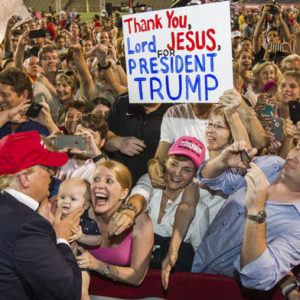The Christian magazine Christian Century recently called on Republican senators to support the impeachment of Donald Trump. In response, some evangelical leaders rallied to Trump’s defense.
The debate poses a question Christians have asked throughout history: What would Jesus say about our political moment?
As Christian pastors and leaders of the Poor People’s Campaign: A National Call for Moral Revival, we want to make clear that health care, justice, living wages and decent housing are central themes in the Bible.
The word “evangelical” comes from the Greek word meaning “good news.” It’s associated with bringing good news and justice to the ptochos — those who have been made poor because of unjust policies and distorted power.
Throughout the New Testament, we learn to honor God by treating our neighbors right and doing the work of justice. The legal codes of the Old Testament, too, are about worshipping God by caring for your community.
How has this administration cared for our community and neighbors?
Over 140 million Americans are poor or one emergency away from poverty, the Institute for Policy Studies finds. Yet the administration has lavished tax cuts on the wealthy while taking food off poor families’ tables, all while pouring hundreds of billions into destructive wars. When desperate refugees seek shelter here, it’s torn them from their families and warehoused them in prisons.
The prophets proclaim that holiness is “justice rolling down like water.” Yet Trump’s evangelical backers have joined a long line of enablers praying for a political leader who is preying on the poor.
Jerry Falwell Jr. and Franklin Graham quote the Bible to call for submission to earthly authorities. Paula White-Cain blesses U.S. military domination of the globe as godly. Robert Jeffress claims the Bible is about building up walls and tearing families apart.
However, throughout the Bible are more than 2,000 passages on using power and authority to protect the vulnerable, not exploit them.
“Listen, leaders of Jacob, leaders of Israel,” Micah 3 intones. “Isn’t justice in your job description? But you skin my people alive. You rip the meat off their bones. You break up the bones, chop the meat, and throw it in a pot for cannibal stew.”
Sinful leaders, Micah charges, “build Zion by killing people” and “committing crimes.” Yet “as long as they’re well paid and well fed, the prophets preach, ‘Isn’t life wonderful! Peace to all!’”
Elsewhere, Isaiah 10 warns lawmakers: “Woe to those who make unjust laws, to those who issue oppressive decrees, to deprive the poor of their rights and withhold justice from the oppressed of my people, making widows their prey and robbing homeless children.”
And James 5 warns their wealthy supporters: “Now listen, you rich people, weep and wail because of the misery that is coming on you. … The wages you failed to pay the workers who mowed your fields are crying out against you.”
And finally, Luke 1 reminds us: “God has brought down rulers from their thrones but has lifted up the humble. He has filled the hungry with good things but has sent the rich away empty.”
By biblical standards, the real crimes of our government are barely scratched by the impeachment trial now underway. Instead, we are seeing in this presidency what faith leaders have seen throughout history: politicians cloaking extremist policies with religious rhetoric, while faith leaders serve as priests of the empire rather than chaplains of a movement.
Nevertheless, there is a growing moral movement in the United States, led by those most affected by systemic racism, poverty, ecological devastation, militarism and the distorted moral narrative of Christian nationalism. This movement is non-partisan but very political. It does not see the issues of our time as right versus left, but instead right versus wrong.
Sixteen national faith bodies have signed onto the moral agenda of the Poor People’s Campaign, calling for major investments to eliminate poverty, protect our planet, end wars and ensure human dignity. These faith bodies represent millions of people from across the political spectrum — and across race, geography and religion.
Poor people, clergy and moral activists are organizing a Mass Poor People’s Assembly and Moral March on Washington for June 20, 2020, where we will echo Jesus’ call to the nations: “That which you do to the least of these … you do to me.”
This, in fact, is the good news — evangelicalism — not simply for the poor, but from them.

